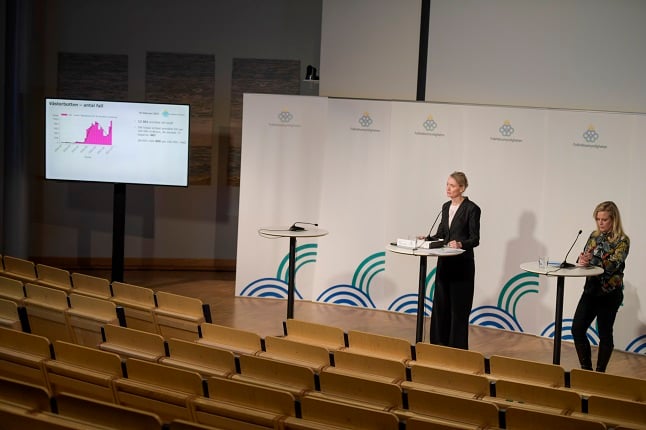The Public Health Agency's Karin Tegmark Wisell explained that over the past few weeks the number of newly reported cases had remained at a relatively stable level; in other words the number of cases was continuing to increase but not at an exponential rate.
But there were signs that this trend had been broken. Nationwide, 400 new cases were reported per 100,000 residents over the past 14 days, an increase from the previous week.
That number was higher in regions such as Västerbotten, Västra Götaland and Jönköping.
In Stockholm the case incidence was slightly lower at 316 cases per 100,000 residents, but Tegmark Wisell said it was “worrying that the spread of infection hasn't continued to fall and that we see a rise in reported cases”.
-
EXPLAINED: What are the guidelines in Sweden for the winter sports break?
- Stockholm pushes back Covid-19 vaccine deadline
Answering a question from Aftonbladet about why the infection was rising, she said “there are several signs that compliance [with national coronavirus measures] is less good than earlier” and that “people are working from the workplace in larger numbers”, despite no change to recommendations.
She also added that Sweden's 21 regions had reports that there was low compliance with the recommendation to wear face masks on public transport during rush hour.
“It is a continued very serious situation, a high number of cases, and worrying when it comes to the development of the infection,” she said. “I want to remind people of the importance of us all working intensively to take responsibility, we all need to do everything to keep the spread of infection down so that we can handle the pandemic.”
“We do this together,” she said. “Follow the general recommendations, which are now legislated, and other recommendations from authorities. It is incredibly important to stay at home if you have symptoms, even if you only feel a little bit ill.
“It is also incredibly important to work from home to the extent that it is possible. There is no change there. There is a widespread spread of infection in the country and we know that workplaces are an environment where the infection spreads. If you don't have the opportunity to work from home, you have a responsibility, together with your employer, to create a workplace that is as safe as possible, by keeping a distance from others both indoors and outdoors, and at workplaces and in other situations where you cannot keep a distance, we have recommendations about what applies for other protection, it might be relevant to wear a face mask.”
-
Can my boss force me to return to the office?
- Readers reveal: How our Swedish workplaces faced the coronavirus crisis
Although Sweden does not recommend the wearing of masks in wider society outside rush hour on public transport, it does list masks as one measure workplaces can introduce to reduce the risk of infection in situations where close contact cannot be avoided.
“It is incredibly important to socialise in a small circle only. Avoid new close contacts. Only socialise with those in your household, or at work or school. No other contacts outside your household, to avoid spreading the infection to new circles, and for those who don't live in a household, remain within the close contacts you normally have.”
The Local asked for clarification about whether this should be interpreted as a step up from the restriction “socialise only in a smaller circle”.
“No, this is the same advice that has been in place since before Christmas,” Tegmark Wisell said.
When we asked what the advice meant for people who live alone, she explained that the agency did not refer to “households” in their written guidelines specifically “because it is important to have contact with other people. It is about a close circle, and we describe it in different ways, a 'bubble' or 'the people you socialise with', so that you don't socialise with lots of different people but keep to a limited circle. For some people that means the people in their household, for others it means someone or some people in another household.”
When the measures were first introduced before Christmas, authorities stressed that close contact – spending time less than two metres apart for more than 15 minutes – should be limited only to your closest friends or family.
The government has reiterated that a maximum of eight people should be the norm, and that individuals should stay within the same bubble of eight people rather than for example meeting one group one day and a different group a few days later. Ministers have also stressed that if you are able to limit socialising to fewer than eight people, for example if you live with fewer than eight people and can all work from home, you should not look for extra people to invite so that you reach eight.
But the Public Health Agency has opted not to set a precise number in order to allow people to adapt the guidance to their personal situation.


 Please whitelist us to continue reading.
Please whitelist us to continue reading.
Member comments